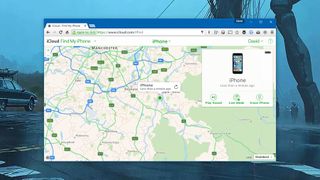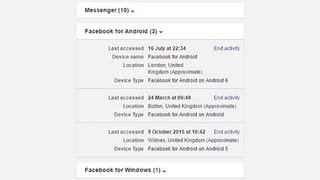The smartphone shows no signs of being a less essential bit of gadgetry anytime soon, and they've become so intertwined with our daily lives that losing one - or having it stolen - isn't a particularly pleasant experience. The first rule to remember is: don't panic.
Take a deep breath and follow our guide to what to do next if your phone disappears for whatever reason - stick with us and you don't have to worry about a hugely inflated phone bill or someone snooping inside your apps... in fact, you might just get your phone back.
Find (and lock) your phone

The situation is slightly less pressing if your phone is simply lost rather than stolen, but whether someone's pinched it from your bag or you just can't find it, use the phone finding features built into iOS and Android to see if you can locate it again (assuming these tools are switched on - you usually agree to use them when you set up a new device).
If you're an iPhone user, head to iCloud, log in, and you should see a Find iPhone icon - click this to locate, ring, lock or even wipe your device. For the Android users among you, go to Android Device Manager and sign in, and as with the Apple service you can ring, lock or erase your Android phone, and check its most recently reported position on a map.
Needless to say, if you're dealing with a thief then it's not all that clever to try and get your phone back yourself - contact the police (see below) and give them the details instead. However, if you're just wondering which of your many friends' houses you've left your phone at, then using one of these options might be all you need to do to get it back.
Contact your operator

If your phone's been pinched, or you think it might've been, then it's a good idea to do this first before looking for your mobile on a map - that's because your operator will be able to put a block on the device and stop the thief in question charging phone calls and texts to your account (or even buying items through apps), leaving you with an unwanted bill.
The major operators will send you a new SIM (with the same number) and cancel your old one; the contact numbers they make available are open around the clock and they'll even call you back if needed. It's best to let them know as quickly as you can, though obviously if you think your phone is still in the house or office have a good root around first.
When you call your operator the person on the other end of the line will tell you what you need to do next and how to claim any insurance due (if you took it out in the first place) - if insurance claims are involved, rather than just a SIM block and replacement, then you'll typically need a crime reference number, and that brings us neatly on to...
Contact the police

You might want to do this first of all in the case of a robbery or not at all if you just can't remember where you last saw your phone around the living room. With a theft, even if you don't hold out much hope of getting your phone back, you will still get a crime reference number or a loss reference number which you need for making any insurance claims.
Go into your local station or ring 101 to make a report about a lost or stolen phone. Only use 999 in emergencies: if "a crime is in progress, someone suspected of a crime is nearby, when there is danger to life or when violence is being used or threatened" in the police's own words, so leaving your phone on the train doesn't count (try lost property for that).
The police have a National Mobile Phone Crime Unit up and running - you can register your phone's details which may improve your chances of seeing your handset again. If you need to state your phone's unique identification number (IMEI or International Mobile Station Equipment Identity) at any point, your operator should be able to provide it.
Check and sign out of all your accounts

You do have a PIN code or fingerprint recognition protecting your phone, don't you? Don't you? If you don't you really should, because it's all that stands between a thief or passerby and all your apps. Whether or not your lock screen is secure, it's a good idea to go through all your online accounts and services, change passwords, and remotely log out if you can.
Think Facebook, Twitter, Gmail, Dropbox, iTunes and the like. It's important that you log into these accounts on a computer wherever possible and change your password - in some cases you can log out of your phone remotely (for example, on the Facebook settings page on the web, there's an option on the Security page to force your phone to be signed out).
Check the help pages for your main accounts, and don't forget your mobile web browser either, which probably has usernames and passwords synced to it (here are Google's instructions for signing out of Chrome remotely). You should at least be able to change your password, which is usually enough to force a user to sign in again on another device.
- Speaking of smartphones, here are our recommendations for the very best ones



